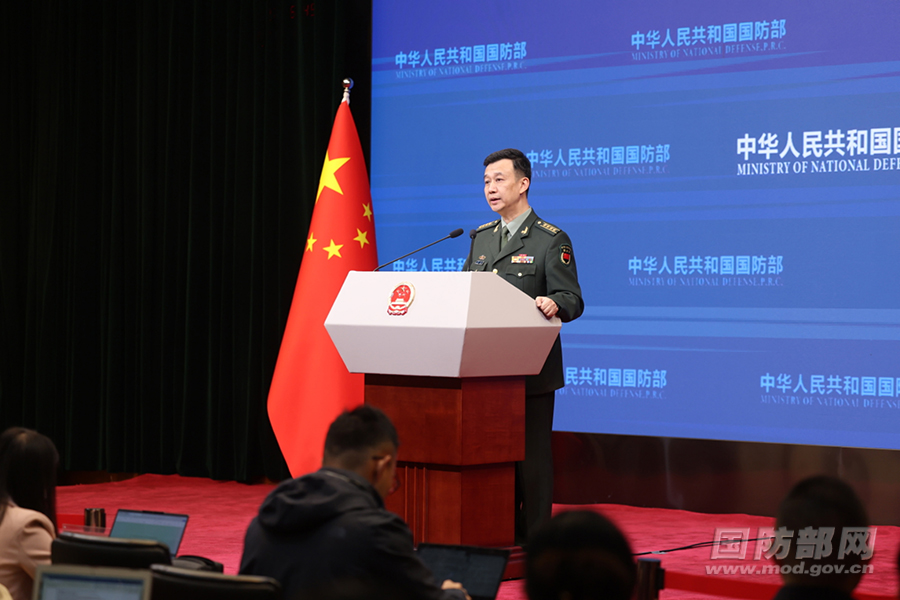
Senior Colonel Wu Qian, spokesperson for the Ministry of National Defense (MND) of the People's Republic of China (PRC), answers questions at a regular press conference on the afternoon of March 27, 2025. (mod.gov.cn/Photo by Li Xiaowei)
(The following English text is for reference. In case of any divergence of interpretation, the Chinese text shall prevail.)
Wu Qian: Friends from the media, good afternoon. Welcome to this month's regular press conference of the Ministry of National Defense (MND). First of all, I would like to introduce a group of friends in red jackets. They are the faculty and student representatives from Beijing Institute of Technology (BIT), welcome!
Today, I have one piece of information to announce on the top.
The Chinese MND hosted the first meeting of International Military Cooperation Organs of the Shanghai Cooperation Organization (SCO) Member States for 2025 in Qingdao, Shandong Province, from March 26 to 27. Over 30 representatives from defense ministries of the SCO member states and the SCO Secretariat attended the meeting. The participants had in-depth discussions on deepening defense and security cooperation within the SCO framework and expressed willingness to maintain close communication to prepare for the upcoming Defense Ministers' Meeting of the SCO Member States to be held in China.
Now the floor is open for questions.
Journalist: President Xi attended the plenary meeting of the delegation of the PLA and the PAP during the third session of the 14th NPC and delivered an important speech, emphasizing the need to promote high-quality development and implement the 14th Five-Year Plan for military development. Could you provide an update on the progress of the military's 14th Five-Year Plan? What are the key challenges going forward?
Wu Qian: Over the past four years of implementing tasks in the 14th Five-Year Plan, the military has made great efforts to achieve its centenary goal and strengthen combat effectiveness. A number of major outcomes have been reached, in particular on producing new quality combat capabilities. The strategic capabilities of the PLA in fulfilling its missions in the new era have been continuously strengthened. However, there are still many challenges and arduous tasks remained. We are now in a key stage of overcoming challenges and winning this uphill battle.
Follow the guidance of President Xi's important speech, the military will bolster confidence, address challenges, and redouble our efforts in implementing the plan. First, striking a balance between progress and quality. We will continue to improve strategic management and strengthen process control. While ensuring progress is made on time, we will strive to realize performance targets and prevent any compromise in quality for meeting deadlines.
Second, striking a balance between cost and benefit. We will remain committed to a path of high-quality, high-effectiveness, low-cost and sustainable development. We will leverage civilian strengths and resources, properly allocate defense resources and investment, and make the use of defense budget more precise and efficient.
Third, striking a balance between the overall plan and key priorities. We will strengthen general coordination and targeted adjustment, and concentrate efforts on major projects and key initiatives, so as to advance the implementation of the overall plan through breakthroughs in key areas.
Fourth, striking a balance between development and supervision. We will put more emphasis on supervision and build a comprehensive and effective regulatory system to forge synergy and ensure development quality, timely formation of capabilities, and the red line of no corruption.
Fifth, striking a balance between implementation of the plan and formation of capabilities. We will innovate models for generating combat power, establish a rapid response and conversion mechanism for advanced technologies, and accelerate the transition from project delivery to capability delivery, ensuring the timely formation of a strong and capable combat force.
Journalist: The leader of the Taiwan region, Lai Ching-te, recently made separatist remarks claiming that the two sides across the Taiwan Strait are "not subordinate to each other" and called the mainland a "foreign hostile force". In mid-March, the PLA conducted a military exercise near Taiwan. Some said that the exercise was a countermeasure against Lai Ching-te's separatist rhetoric and recent movements between Taiwan and the US. What's your comment?
Wu Qian: As the Chinese saying goes, "When the heaven is about to destroy someone, it first makes them having lunatic ideas." Taiwan is a part of China. It has never been a nation. It wasn't in the past. It is not at present, and it will never be in the future.
Recently, naval and air troops of the PLA Eastern Theater Command conducted readiness patrols and joint exercises in areas around Taiwan to test and enhance their war-fighting capabilities. It serves as an effective punishment and deterrence against the "Taiwan independence" separatists and a stern warning against external interfering forces. It is fully legitimate and necessary.
The people's military will resolutely implement the Party's overall strategy for resolving the Taiwan question in the new era. We will remain ready and able to fight and win at all times, and will take resolute measures to defeat any separatist attempt for "Taiwan independence".
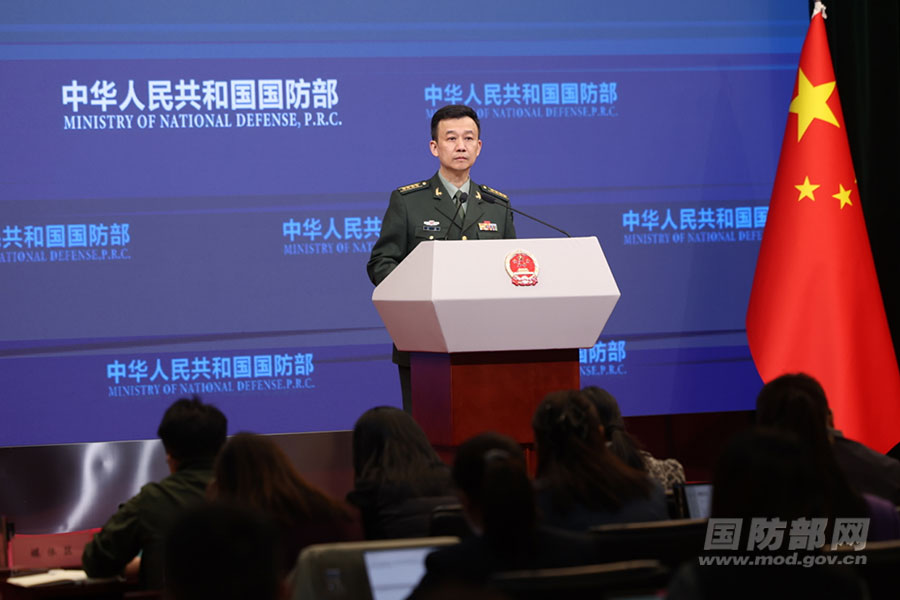
Senior Colonel Wu Qian, spokesperson for the Ministry of National Defense (MND) of the People's Republic of China (PRC), answers questions at a regular press conference on the afternoon of March 27, 2025. (mod.gov.cn/Photo by Li Xiaowei)
Journalist: The US Defense Secretary will visit the Philippines and the two sides may discuss responding to China's activities in the South China Sea and US support to Philippine forces. Meanwhile, Philippine's ambassador to the US said recently that this visit would show China the solid bond between the Philippines and the US and his country was confirmed that US security commitment would not change. Do you have any comment?
Wu Qian: Military cooperation between the US and the Philippines should not harm security interests of other countries or undermine regional peace and stability. By the way, if we look back into history, the US actually maintains an astonishing record in reneging on promises and betraying allies.
Journalist: Will the Chinese and US militaries have high-level engagements soon? Please give us an update on the China-US military relationship.
Wu Qian: On China-US mil-mil engagement, the two sides had some discussions and preliminary consensus. We will advance accordingly. Building a stable China-US mil-mil relationship serves the shared interests of both sides and is a common expectation of the international community. As the Latin proverb goes, set your course by the stars, not follow the waves. On growing the China-US mil-mil relationship, we should follow the principle of mutual-respect, peaceful coexistence and win-win cooperation, strengthen communications and dialogues, and properly handle differences. We hope with efforts from both sides, the mil-mil relationship can grow on a sound and stable track.
Journalist: I have two questions. The first one. It is reported that China's aircraft carrier Fujian has recently set sail for its seventh sea trial. Some analysts suggest that the focus of this trial is catapult launch and arrested landing. Can you confirm this?
The second question. It is reported that in response to China's increasing defense budget in 2025, Japan's Chief Cabinet Secretary said that China's rapid military buildup, combined with a lack of transparency, is a "matter of serious concern for Japan and the international community." Additionally, reports suggest that the Japan Self-Defense Forces recently established a Joint Operations Command, and due to concerns over a potential armed attack on Taiwan by the mainland, Japan plans to deploy long-range missiles in Kyushu by the end of 2025. What is your comment on this?
Wu Qian: I have no information to release on your first question. The sea trial is a routine arrangement for the construction of PLANS Fujian. Please take it easy.
As for your second question, regarding China's 2025 defense budget, we have provided a detailed explanation. The size, structure, and usage of the budget is open, transparent and beyond reproach. In fact, Japan, as a country that launched aggressive wars during World War II, is the least qualified to criticize defense budgets of other nations. The international community should be alerted to Japan's recent efforts in breaking its pacifist constitution and the "exclusively defense-oriented" policy. Japan has significantly increased its defense spending and developed long-range offensive capabilities, heading down the path of military expansion. Such behavior is exactly what peace-loving countries, particularly those once invaded by Japanese militarists, need to be vigilant against and opposed to.
This year we will have the 80th anniversary of the victory of the Chinese People's War of Resistance against Japanese Aggression and the World Anti-Fascist War. We urge the Japan side to take lessons from history, adhere to the path of peaceful development, act prudently in the field of military security, and stop misinterpreting China's defense policies and military strategies, so as to avoid further eroding its credibility among its Asian neighbors and the international community. It must be emphasized that the Taiwan question is none of Japan's business, and we firmly oppose Japan's attempts to exploit this matter for its own agenda. Only by upholding the one-China principle and resolutely opposing "Taiwan independence" can peace and stability in the Taiwan Strait be ensured.
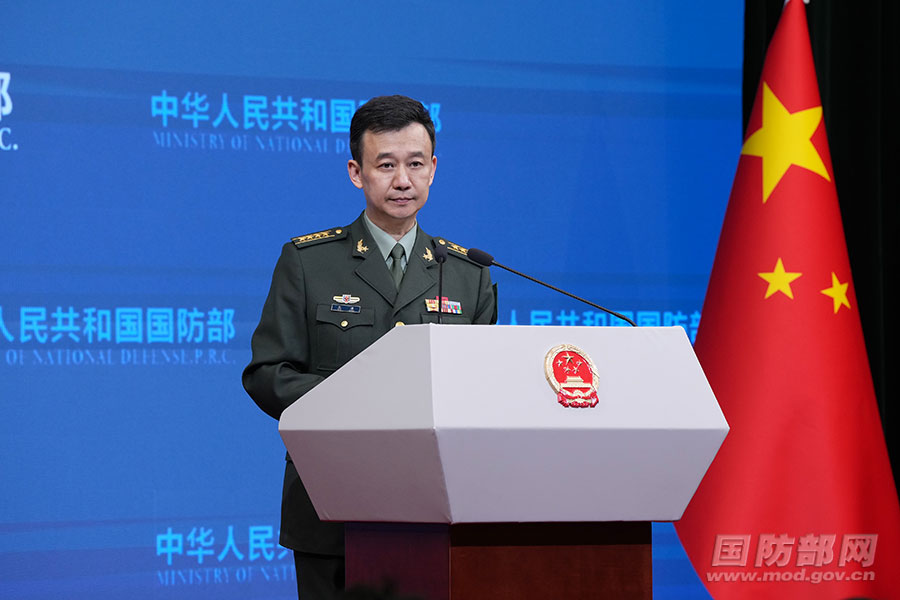
Senior Colonel Wu Qian, spokesperson for the Ministry of National Defense (MND) of the People's Republic of China (PRC), answers questions at a regular press conference on the afternoon of March 27, 2025. (mod.gov.cn/Photo by Li Xiaowei)
Journalist: According to foreign media reports, the recent G7 Foreign Ministers' Meeting issued a joint statement expressing concerns over China's expansion of its nuclear arsenal, and the situation in the East and South China Seas. The statement emphasizes the importance of maintaining peace and stability in the Taiwan Strait, and opposes any unilateral alteration of the status quo through force or coercion. What is your comment on this?
Wu Qian: The G7 statement ignores facts and is a vicious slander on China and a brutal interference in China's internal affairs. We strongly condemn and resolutely oppose it. China follows a policy of no-first-use of nuclear weapons and a defensive nuclear strategy. We have been maintaining our nuclear arsenal at the minimum level required for national security. On the nuclear issue, the G7 should reflect on its own actions and has no qualification to criticize China.
Regarding the East and South China Seas, China is engaging in peaceful dialogue and consultation with relevant countries to resolve disputes. At the same time, we remain steadfast in safeguarding our territorial sovereignty and maritime rights and interests. China firmly opposes interference from external forces and any provocative acts that undermine regional peace and stability. Taiwan is an inalienable part of China, and the Taiwan question brooks no foreign interference. The one-China principle is a wide consensus of the international community and a fundamental norm in international relations. Any attempt to separate the island from its motherland will inevitably end in complete failure.
We urge the G7 to break away from its Cold War mentality and ideological prejudice, stop the finger-pointing and preaching at others. This approach won't work on the Chinese military.
Journalist: It is reported that China, Iran, and Russia recently conducted "Security Belt 2025" joint exercise. Could you provide more details?
Wu Qian: In accordance with the annual plan and the consensus reached by China, Iran and Russia, the three countries' naval forces conducted "Security Belt 2025" joint exercise near Iran's Chabahar Port from March 9 to 13. Following the theme of "Building Peace and Security Together", the three sides sent over 10 vessels, as well as special operations and diving units, to the exercise. Focusing on counter-terrorism and counter-piracy operations, the troops trained on subjects including maritime target striking, VBSS (visit, board, search and seizure), damage control, and joint search and rescue. The exercise tested tactical command coordination and interoperabilities of the participating forces, and deepened military trust and practical cooperation among the three countries. During the exercise, the troops also had on-board visits and cultural and sports exchanges to enhance mutual understanding and friendship. Since 2019, China, Iran, and Russia have successfully conducted five joint maritime exercises. China is willing to actively engage in maritime security cooperation with all parties, and make new contributions to world and regional peace and stability.
Journalist: The pace of the China-India dialogue on many fronts has significantly increased. We've just seen the Working Mechanism for Consultation and Coordination on Border Affairs (WMCC) meeting was conducted a few days ago. What are the latest developments regarding the disengagement process along the Line of Actual Control (LAC)?
Wu Qian: On the 33rd meeting of the WMCC, the MFA has already released the information on it, and the two sides have agreed to continue to take effective measures to safeguard peace and tranquility along the China-India border.
The Chinese Military is willing to work together with our Indian counterparts to implement a fair and just solution to the border issue. We are committed to contributing our wisdom and strength to the vision of a harmonious dance between the Chinese dragon and the Indian elephant, and to fostering a sound and stable military-to-military relationship.
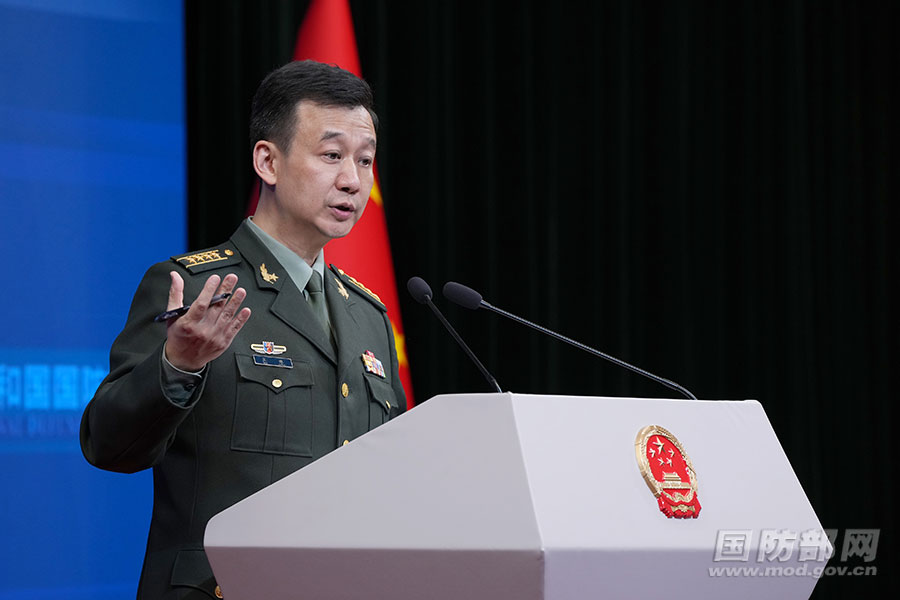
Senior Colonel Wu Qian, spokesperson for the Ministry of National Defense (MND) of the People's Republic of China (PRC), answers questions at a regular press conference on the afternoon of March 27, 2025. (mod.gov.cn/Photo by Li Xiaowei)
Journalist: The Ministry of State Security has reportedly disclosed information about four members of the "Information, Communications, and Electronic Force Command" of Taiwan. What is your comment on this?
Wu Qian: Justice has long arms. Those who play with fire should have no illusion of escaping. No one who pushes for "Taiwan independence" or engages in seceding the motherland would be spared by justice.
Journalist: It is reported that the first round of direct recruitment of military officers for 2025 has recently started, receiving wide attention among university graduates. Could you provide more details about this?
Wu Qian: To attract great talent and college graduates to join the military, the CMC Political Work Department has recently launched the first round of direct recruitment of military officers for 2025. Currently, tens of thousands of college graduates from universities and disciplines included in the "Double World-Class Project" have registered through the official website (http://81rc.81.cn or http://www.81rc.mil.cn). Direct recruitment is an important channel for selecting and replenishing active-duty military (police) officers, and an effective means to optimize the structure and improve the quality of officers. The aim is to attract and leverage talents from across the nation.
The path to a strong military lies in the personnel. A first-class military needs first-class talent. The Chinese military welcomes you to dedicate your youth and realize your dreams in the military. A brilliant life awaits you here.
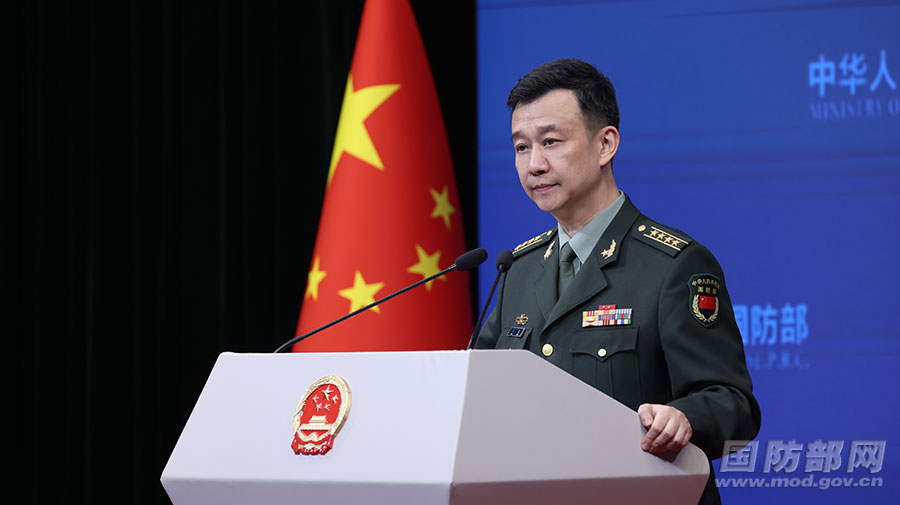
Senior Colonel Wu Qian, spokesperson for the Ministry of National Defense (MND) of the People's Republic of China (PRC), answers questions at a regular press conference on the afternoon of March 27, 2025. (mod.gov.cn/Photo by Li Xiaowei)
Journalist: I have two questions. First, the US and the Philippines held a joint exercise before the visit of the US Defense Secretary to the Philippines. Some experts believe that the two countries are going to have more exercises in the South China Sea and other areas in the future. Will the PLA have any response? Second, recently, the US Secretary of Defense Pete Hegseth initiated an opinion poll on social media, discussing whether to change the US Department of Defense to the Department of War. Pete has said previously that the US did not seek to have a war with China but would rebuild its military to prepare for war. What's your comment on that?
Wu Qian: On the military cooperation between the Philippines and the US, I have already commented. Here, I would like to emphasize one point on the South China Sea issue: China firmly opposes interference from outside countries. The Chinese military will take all necessary measures to protect our national sovereignty and interests and to safeguard regional peace and stability.
On your second question, whether the US Department of Defense changes its name or not is an internal affair of the US, and we will not comment on that. However, we firmly oppose the US's previous rhetoric which instigates China-US confrontation. We urge the US to abandon its zero-sum mentality and not to project its hegemonic mentality onto China. We hope that the US can refrain from provoking confrontation and take effective measures to safeguard a stable China-US military relationship. The Chinese military will firmly respond to any threat and provocation with a stronger will, stronger capabilities, and more reliable means.
Journalist: It is reported that China and Thailand are conducting "Blue Strike-2025" joint naval training. Could you provide more details?
Wu Qian: In accordance with the annual plan and the consensus reached between the navies of China and Thailand, the two sides started the "Blue Strike-2025" joint naval training near Zhanjiang of China's Guangdong Province on March 26, which will last till April 2. A total of 11 vessels and two marine detachments will participate in the exercise. Starting from March 26, the training will cover subjects including joint maritime strike operations, air defense and missile defense, maritime search and rescue, as well as counter-terrorism and anti-piracy operations. It is aimed to promote technical and tactical exchanges between the two navies and strengthen their capabilities of jointly addressing maritime security threats. This marks the sixth iteration of the "Blue Strike" joint naval training. By strengthening training collaboration, the two navies will further deepen cooperation, share experiences, and foster friendship and trust. This holds significant importance for maintaining regional peace and stability.
Journalist: Foreign media reports say that the Ream Naval Base of Cambodia which is constructed with the assistance of China will start operating in early April this year. It is also said that government leaders from Cambodia and Chinese representatives will participate in the opening ceremony. Can you confirm that? And does this mean there will be new cooperation between the Chinese and Cambodian militaries?
Wu Qian: In recent years, the military cooperation between China and Cambodia has been deepened and the two sides have had cooperation including joint training and personnel training in the Ream Naval Base. As for information on other activities, please follow up on our authoritative information release.
Journalist: I have two questions. The first question is that media reports say that the PLA is currently building at least three barges that can be used in landing operations against Taiwan. These barges are equipped with springboards over 100 meters in length, allowing tanks to traverse sandy beaches and directly move to the shore. Can you confirm this? My second question is that the leader of the Taiwan region Lai Ching-te is set to raise the income of Taiwanese servicemen to address the problem of a lack of personnel and a high rate of departure. Taiwan's military authorities also said this is a response to the decrease in its personnel. What's your comment on that?
Wu Qian: On your first question about the military equipment, I have no information to release.
For your second question, any small trick pushed by the DPP authorities to seek independence and resist unification with force is futile and a dead-end. This will not stop the historical trend of reunification. The PLA has full capability to destroy any attempt to seek independence and resist unification
Journalist: The US Indo-Pacific commander said recently that the PLA's exercises around Taiwan are not only exercises but preparations for an invasion of Taiwan. The US military will put its priority in the Indo-Pacific theater. According to Taiwan's Democratic Progressive Party, the PLA's exercises may one day turn into real battles. Taiwan recently held the first "Mini Han Kuang" drills to enhance its combat readiness and capabilities. Do you have any comment?
Wu Qian: The exercises conducted by the PLA are targeted against "Taiwan independence" separatists and foreign interference. The Taiwan question is purely an internal affair of China that allows no foreign interference. The activities conducted by the PLA Eastern Theater Command around Taiwan Island are aimed to improve the real combat capabilities against separatism and interference. They are necessary actions to safeguard national sovereignty and territorial integrity and strong deterrence against joint retrogressive provocation made by the US and Taiwan.
As for the comment from the DPP, I want to let them know that any attempt to seek independence by force is futile and cannot change its destiny of being a failure.
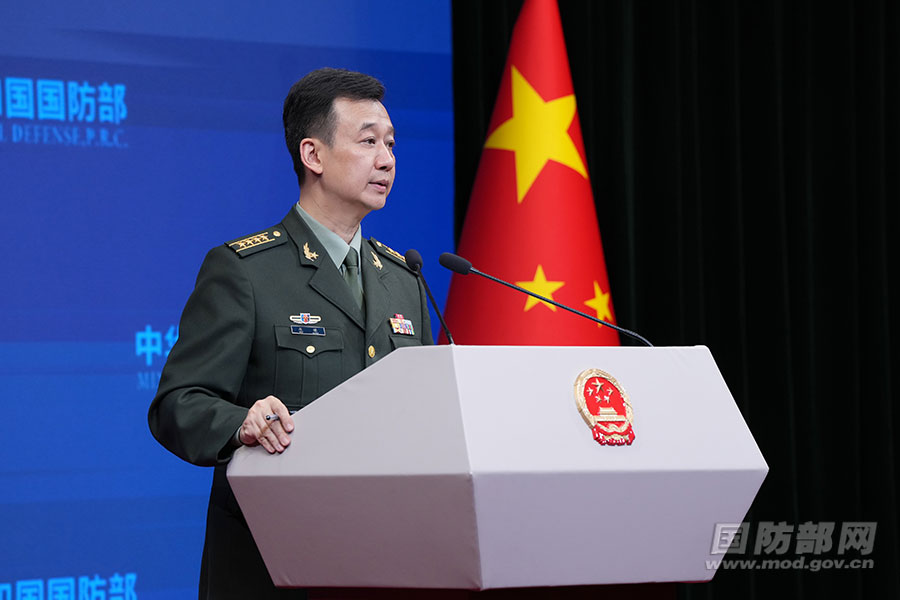
Senior Colonel Wu Qian, spokesperson for the Ministry of National Defense (MND) of the People's Republic of China (PRC), answers questions at a regular press conference on the afternoon of March 27, 2025. (mod.gov.cn/Photo by Li Xiaowei)
Journalist: According to reports, the Chief of Staff of the Armed Forces of the Philippines Romeo Brawner recently said that the Philippines and its allies are trying to expand the Squad group to India and South Korea to counter China in the Indo-Pacific region. He also said that the Squad is an unofficial cooperation platform among the Philippines, the US, Japan and Australia in terms of military affairs, intelligence sharing, as well as joint exercises and operations. Do you have any comment?
Wu Qian: The remarks of the Philippine side are creating antagonism and confrontation. We firmly oppose that. China believes that military cooperation between relevant countries should not target any third party and should not undermine regional peace and stability.
Journalist: I have two questions. Firstly, in recent years, the mainland has conducted many joint military exercises around Taiwan. The Wall Street Journal recently published a report titled China is Ready to Blockade Taiwan. Some military experts from Western countries believe that the mainland is more likely to take an approach of isolation and pressure. What's your comment on this? Second, the mainland has conducted many military exercises in recent years and the rhetoric of "reunification by force" has emerged. These have attracted international attention. Taiwan also announced its so-called 17 strategies in response. Many worry that the cross-strait relationship will move to another Taiwan Strait Crisis like what we had in 1996. What's your comment on that?
Wu Qian: On your first question, Taiwan is China's Taiwan. The Taiwan question is purely China's internal affair. Resolving the Taiwan question is a matter for the Chinese people to decide. The reports you mentioned are deliberately instigating confrontation across the Strait. The exercises taken by the PLA around Taiwan are targeted at "Taiwan independence" separatists and foreign interference. The aim is to safeguard China’s national sovereignty and territorial integrity and the peace and stability across the Taiwan Strait.
For your second question, I want to point out that the separatist act of "Taiwan independence" and foreign interference are the root cause of the tension across the Taiwan Strait. We are willing to strive for the prospect of peaceful reunification with the greatest sincerity and utmost efforts, but we will never allow Taiwan to be separated from the motherland. The higher the "Taiwan independence" supporters jump, the closer they will be to death.
Wu Qian: Before I conclude, I'd like to introduce to you the faculty and student representatives from Beijing Institute of Technology (BIT). We are glad to have them observing the press conference. The BIT was the first science and engineering university founded by the CPC and the first defense industry university in the PRC. Since its founding 85 years ago, the BIT has prioritized virtue and professionalism in cultivating talent, emphasized national defense and industries in serving the nation and the military, and championed openness, inclusiveness and excellence in achieving innovative development. A great number of leading scientists, trailblazers, and heavyweights have come out from the university.
Living in this great era, today's students of BIT shoulder great responsibilities. Wish all of you carry on BIT's revolutionary traditions, work hard to scale the heights of science, and build and defend the nation with your iron will and scientific knowledge.
If there are no other questions, here concludes today's press conference. To conclude, I wish you every success in your work and good luck in everything in this bright season of spring.













